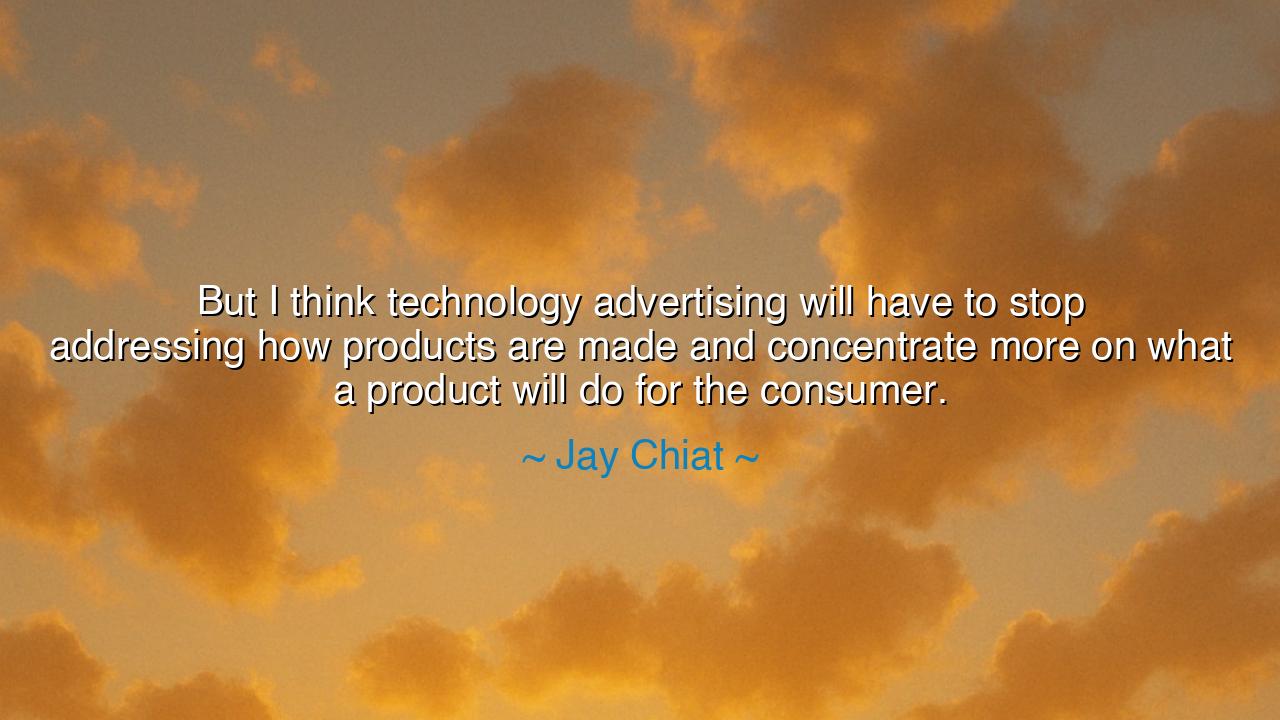
But I think technology advertising will have to stop addressing
But I think technology advertising will have to stop addressing how products are made and concentrate more on what a product will do for the consumer.






The words of Jay Chiat, “But I think technology advertising will have to stop addressing how products are made and concentrate more on what a product will do for the consumer,” shine with prophetic insight into the nature of persuasion and human desire. He reminds us that while the mechanics of invention may inspire awe among the creators, it is the impact upon the lives of ordinary people that awakens hearts and moves them to action. This truth is not only about advertising, but about communication itself: people yearn not for the cold steel of process, but for the warm promise of transformation.
The origin of this wisdom comes from Chiat’s role as one of the most influential figures in modern advertising, a man who helped birth campaigns that defined culture. In an age when technology was rapidly advancing—computers shrinking in size, networks spreading, and digital tools entering daily life—many companies sought to impress with technical jargon, numbers, and processes. Chiat, however, saw deeper: the true victory would not be in boasting of how something was made, but in revealing how it would enrich the lives of those who touched it. His vision foreshadowed the consumer-centered world in which we now live.
History offers a perfect illustration in the story of Apple Computer in the 1980s. When others in the computer industry filled their advertisements with specifications, processors, and circuitry, Apple dared to speak instead of creativity, freedom, and empowerment. The famous “1984” commercial, overseen by Chiat’s own agency, did not describe how the Macintosh was built. It showed what it could mean: a tool that would shatter conformity, liberate individuals, and bring imagination to life. In that moment, advertising ascended beyond mechanics and became myth.
This truth extends far beyond commerce. Consider the ancient orators who sought to move nations. When Pericles spoke to the Athenians, he did not enumerate the stone and timber used in building their city. He painted a vision of what Athens stood for—freedom, democracy, the glory of human achievement. So too, the great leaders of any age understand that people are not stirred by technical detail, but by the promise of change, the dream of what life might become through their choices.
The lesson, therefore, is not limited to advertising, but to all forms of human expression: when you wish to inspire, speak not only of the how, but of the why. Do not bury others beneath the weight of process, but lift them with the image of what can be achieved. The craftsman, the teacher, the leader, and even the parent—each must learn to illuminate the horizon, not merely the bricks of the road. For it is the vision of the destination that gives meaning to the path.
Practical wisdom flows from this. If you create, if you sell, if you teach, always frame your message in terms of the lives you will touch. When speaking of your work, ask yourself: How will this heal, strengthen, or empower another soul? Craft your words to show the benefits and not only the mechanics. Let your story connect the gift of your labor to the needs of others, for this is how understanding deepens, trust grows, and hearts are moved to embrace what you offer.
Thus, let us carry forward the vision of Jay Chiat: technology, and all creation, must be explained not as a marvel of construction, but as a companion of transformation. Products are not steel and wires; they are bridges to freedom, creativity, and connection. Speak, then, of what they enable, and your words will endure. In this way, you do not merely describe an object—you kindle a fire of purpose in the souls of those who hear.






AAdministratorAdministrator
Welcome, honored guests. Please leave a comment, we will respond soon